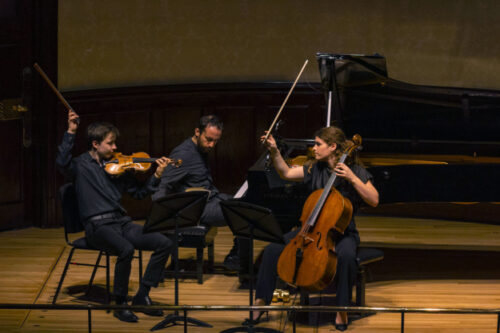 United Kingdom Brahms: Igor Levit (piano), Johan Dalene (violin), Julia Hagen (cello). Wigmore Hall, London, 16.12.2022. (JC)
United Kingdom Brahms: Igor Levit (piano), Johan Dalene (violin), Julia Hagen (cello). Wigmore Hall, London, 16.12.2022. (JC)

Brahms – Violin Sonata No.3 in D minor, Op.108
Schubert – Piano Trio in B-flat major, Op.99
When it comes to drawing popular support, Igor Levit and his friends’ abilities far outweigh the RMT Union’s. Despite Overground and National Rail strikes grinding the country to a halt last Friday and emptying Regent Street of its Christmas shoppers, Wigmore Hall was filled to the brim with excitement in anticipation of the German superstar and his protégés. Levit, a rare mixture of super virtuoso, social butterfly and generous spirit, had decided to take a back seat in this evening of German chamber music, and allow two young talents — violinist Johan Dalene and cellist Julia Hagen — to step into the limelight.
The purpose of showcasing talent in this concert is evident in its programming; it contains only two major pieces — Brahms’s Third Violin Sonata and Schubert’s First Piano Trio — the collective duration of which is shorter than the average recital, with only the fact of their German romantic lineage connecting them together. They are attractive concert pieces containing many earworms, but apart from that there didn’t seem much of an overarching concert programme for the evening.
Nevertheless, both are hardly pieces in which the piano accompanies the string instruments; both require great collaborative effort and unity of musical ideas to make the music come alive. In that respect, I thought it was rather unfortunate that Levit decided to retreat into a more subdued stance in the Brahms even as Dalene played with great passion. There was a great variety of tone in Dalene’s sound, but Levit did not seem to respond, being rather cautious of overpowering the violin. Instead, there seemed to be too much pedal in the piano for the articulation — which is often intricately tied with expression in Brahms’s music — to come through.
Dalene, on the other hand, conveyed unwavering confidence, unafraid to play without music, focusing more on projecting his sound to the audience even if it meant breaking the fourth wall; oftentimes I noticed he flipped several pages at once after some intense playing, as if he had forgotten the music was there. The brief second movement, containing possibly Brahms’s most beautiful melody, was made even more heart-wrenching by Dalene’s sound, which had a very human quality in its richness. The way he poured his heart out while playing made the performance breathtakingly beautiful.
The scherzo third movement was flawless note-wise but seemed to be a little on the safe side, unfortunately at the cost of sounding sprightly. There was a sense of slight disparity in musical ideas; Dalene wanted to go faster, but Levit seemed to prefer stability. The musical imagination which Dalene had stored within him to the brim unfortunately was not given their full due in this misalignment. However, Levit seemed to come alive in the frenzied and virtuosic fourth movement, in which the fast pace allowed him to settle comfortably in his own stride, contradictory as this may sound. When he did decide to join in on the action rather than sit aside passively, the music did seem to come alive. Levit’s great sense of syncopation created an exciting drive, and the sonata finished with quite a flourish. Nevertheless, Levit seemed visibly worn out when taking a bow.
The addition of cellist Julia Hagen in the second half injected more dynamism into the music-making. Schubert’s First Piano Trio in B-flat major is a work on a much larger scale than the Brahms Violin Sonata, but requires a lighter touch and humorous feeling, which seemed to suit Levit much more. The first movement was charged with adrenaline and excitement, and a sense of rapport between the three players were not only written across their faces, but also rippled throughout the audience below; it looked like a lot of fun. The great sense of rhythm in all three players also contributed to the energetic drive of the music. As in the Brahms, Levit allowed each individual player their time to shine whenever they had a solo; unlike the Brahms, it worked well here because it infused the buoyant music with a sense of showmanship which made the performance even more delightful.
The performance of the second movement had its beautiful moments, especially in the duet between the two string instruments over a lilting piano, but it seemed to slightly lack a sense of the broader picture which allowed the music to slip into a sense of repetitiveness. The Scherzo, however, was a delight to listen to, and I marvelled at Igor’s remarkably light touch at the keyboard. The Rondo final movement was a great charm, and the performers really enjoyed themselves with all the surprising turns and playful changes in mood so characteristic of Schubert when he is in a good mood, thus ending the evening in a satisfying and joyous B-flat major.
This was a concert that got better and better as the evening progressed, but I did note, despite being able to maintain a high level of energy and professionalism in his playing, how tired Levit seemed when taking the curtain calls. Perhaps all this concertising with an unfathomably large repertoire has taken its toll, preventing him from committing to the performance with as much energy and passion as the younger performers he brought with him on stage had.
Jeremy Chan
